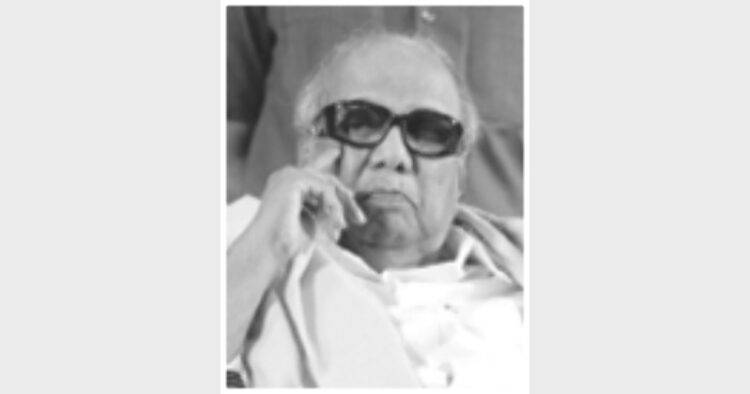Karuna bats against conversion, Hindu temple destruction
V Shanmuganathan
THERE is an unusual expression from Mr. Karunanidhi who is known for his anti-god and anti-religious expressions because he consider himself as an an atheist and nonbeliever. Recently he was angry about the destruction of Hindu temples by the government of Sri Lanka. DMK president M. Karunanidhi has written letters to Prime Minister Manmohan Singh and UPA chairperson Sonia Gandhi to take steps to stop the Sri Lankan government’s latest programme of erasing Tamil Language, culture and religion. M. Karunanidhi sought their help in putting an end to alleged drive by Sri Lankan authorities to rename Tamil villages with Sinhala names.
M. Karunanidhi has written about his anguish in identical letters to Dr. Singh and Ms. Gandhi about many more such tactics being employed by the Sri Lankan government. He has made his distress in an explicit manner and wrote to them that Tamils in Sri Lanka are living in an oppressive environment due to disturbing developments. The Sri Lankan government is now carrying out an intensive and systematic programme of erasing the Tamil Language,culture and religion and diluting the concentration of Tamils in areas where they have historically been predominant. This manifests itself in the renaming of Tamil villages, redrawing of village, district and town boundaries, demolishing Hindu temples. Non-allocation of funds to resettle and rehabilitate internally displaced Tamil families.
“The Sri Lankan Government is also not allocating funds to schools, hospitals and other infrastructure where they live predominantly. It is also promoting Sinhala settlements on Tamil land and Sinhalese take over of the economic life of Tamil areas, which impoverishes the tamils, and the deployment of army camps to intimidate them. India has a moral obligation to stop this as it involved in the eradication of a great culture and ancient religion in our backyard”, he said.
To substansiate his accusations, he gave evidences and said that 89 villages had been renamed with Sinhala terms and 367 Hindu temples had been demolished. There were 148 mini and 13 main army camps in Mullaitivu district alone. Sri Lankan crisis is serious and it is deepening everyday’. Primarily it requires an urgent review of the sufferings and humiliations of the Tamil minorities at the hand of Sinhala majority. It is high time for the intervention by all the democratic countries, particularly by India.
The Tamils in Sri Lanka do not want a separate Eelam except as a last option. And also, they do not want to suffer the terrible discrimination and destruction any more. Tamils want the normal power sharing, possible in any civilised society. Core issue of Sri Lankan Tamil problem and solution lies here. But, the other side is not ready to give or share anything. The Sinhala majority does not want to share power with the minority Tamils by devolution in the constitution. There is a deeper subconscious apprehension in the Sinhala psyche about the Tamil demand for a greater devolution, though the Sinhala community constitutes over 75 per cent of population of SriLanka.
The urgent need today is for India to correctly define its Sri Lanka policy and delineate it’s options, precisely because India has a special responsibility due to her unique historic relationships with Sri Lanka namely geographical neighbours, cultural siblings and also because of national security implications of a festering crisis in the island. The people of Tamil Nadu just across the Palk Strait have long standing and continuing links with the Sri Lankan Tamils which links go many ages back. There was a saint in Tamil Nadu by name Thirignana sambandar. He compared Kedarnath in northern India and Kedheecharam in Sri Lanka. Both the temples are to be worshiped by devotees for attaining mokhsha. There are cultural feelings underlining the people of both the countries. Definitely India should play an effective role to stem the crisis in the island since the two nations are bonded together by history, culture and geography. What is to be cured is the minority complex of the Sinhala majority. It should not deny and destroy the basic human rights of Tamils.
In Sri Lanka, no basic human rights of Tamil minority can be allowed to be trampled upon by the aggressive Sinhala majority. The only long lasting solution to the crisis is devolution of state power, with a federal type constitution. I ndia has a responsibility to persuade the Sri Lankan government for urgent implementation and protect the minority population of Tamils and their temples.














Comments